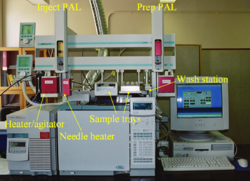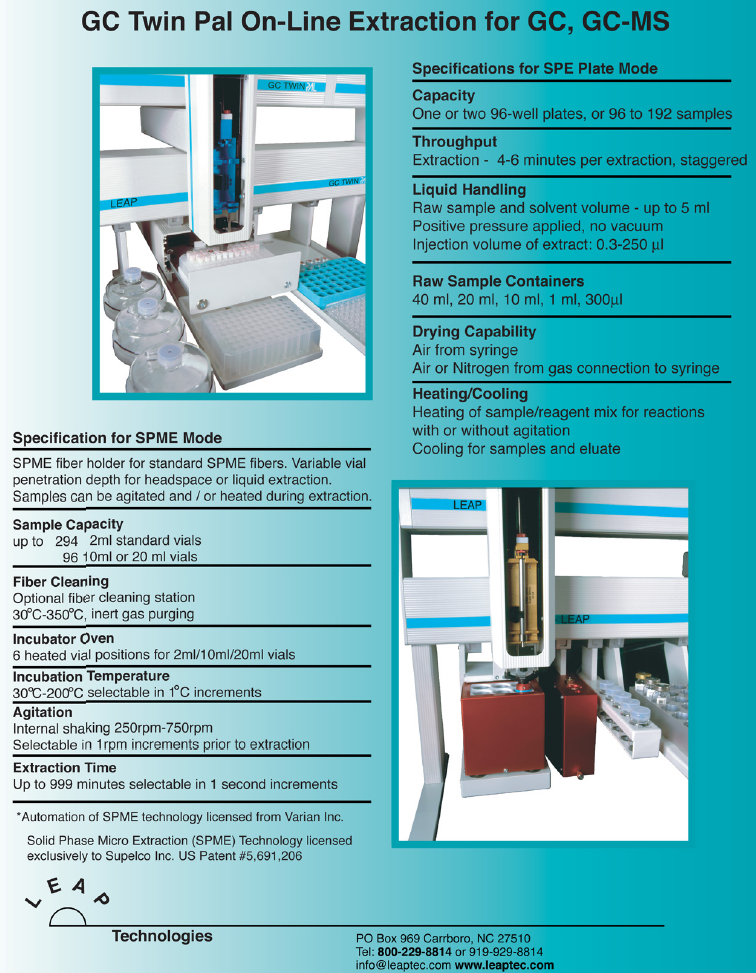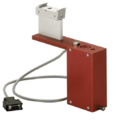SPME
From LEAP
(→Video) |
|||
| Line 72: | Line 72: | ||
[[Image:Movie Icon.png|40px]] [[:media:Combi_SPME_Cycle.wmv| SPME on the PAL]] ''Uses Windows Media Player to view'' <br> | [[Image:Movie Icon.png|40px]] [[:media:Combi_SPME_Cycle.wmv| SPME on the PAL]] ''Uses Windows Media Player to view'' <br> | ||
| - | [[Image:Movie Icon.png|40px]] | + | [[Image:Movie Icon.png|40px]] [http://www.youtube.com/watch?v=hWBjJ13h3EM Video File Movie of the COMBI PAL with SPME in action]<br> |
---- | ---- | ||
Revision as of 15:58, 10 June 2009

| GC SPME |
| Application Type | |
| STANDARD | |
| Application ID | |
| GCSPME | |
| Description | |
| GC SPME |
Contents |
Abstract
Solid phase microextraction, or SPME, is a sample preparation technique used both in the laboratory and on-site. Developed in the early 1990s at the University of Waterloo by Dr. Pawliszyn's group, it is a simple and inexpensive technique where the use of solvents is not necessary.
SPME can be thought of as a very short gas chromatography column turned inside out. SPME involves the use of a fiber coated with an extracting phase, that can be a liquid (polymer) or a solid (sorbent), which extracts different kinds of analytes (including both volatile and non-volatile) from different kinds of media, that can be in liquid or gas phase. The quantity of analyte extracted by the fiber is proportional to its concentration in the sample so long as equilibrium is reached or, in case of short time pre-equilibrium, with help of convection or agitation. After extraction, the SPME fiber is transferred to the injection port of separating instruments, such as a Gas Chromatograph, where desorption of the analyte takes place and analysis is carried out.
The attraction of SPME is that the extraction is fast and simple and can be done without solvents, and detection limits can reach parts per trillion (ppt) levels for certain compounds. SPME also has great potential for field applications; on-site sampling can be done even by nonscientists without the need to have a GC-MS at each location. When properly stored, samples can be analyzed days later in the laboratory without significant loss of volatiles.
Solid phase microextraction is a fast, solvent less alternative to conventional sample extraction techniques. In SPME, analytes establish equilibria among the sample matrix, the headspace above the sample, and a polymer-coated fused fiber, then are desorbed from the fiber to a chromatography column. Because analytes are concentrated on the fiber, and are rapidly delivered to the column, minimum detection limits are improved and resolution is maintained. SPME is compatible with analyte separation/detection by gas chromatography or HPLC, and provides linear results for wide concentrations of analytes.
SPME is an equilibrium process based upon Fick’s 1st law of diffusion
Photos
SPME offers some important advantages:
- Single Step Extraction - reduces sample preparation time by 70%
- Versatility - various selectivities available, adapts to any GC or HPLC system, can be automated
- Efficient & Economical - little/no use of solvents, quantitative method, allows more than 50 extractions per fiber on average
Comparison of SPME to SPE
SPE exhaustively extracts all of the analytes, but they are diluted during elution 1mL of sample containing 1µg/mL of analyte passed through tube, eluted with 1mL of solvent = 1µg/mL X 1µl injection = 1ng (Concentrating to 100µl or injecting 10µl = 10ng on column
SPME partially extracts analytes but desorbs the entire amount 1mL sample containing 1µg/mL of analyte extracted with fiber. 1% goes on fiber. 0.01 x 1µg = 10ng desorbed on column

Downloads
![]() GC TWIN PAL Flyer for SPE and SPME
GC TWIN PAL Flyer for SPE and SPME
Useful links
![]() Sigma Aldrich SPME Website and information
Sigma Aldrich SPME Website and information
![]() General Information on Gas Chromatography
General Information on Gas Chromatography
![]() Definition of SPME from Wikipedia
Definition of SPME from Wikipedia
Video
![]() SPME on the PAL Uses Windows Media Player to view
SPME on the PAL Uses Windows Media Player to view
![]() Video File Movie of the COMBI PAL with SPME in action
Video File Movie of the COMBI PAL with SPME in action
This workstation application is based on the CTC PAL X, Y, Z syringe only autosampler robot from LEAP Technologies. This extremely flexible, precise, and adaptable robotic platform is available in a variety of lengths and options depending on the requirements of your sample preparation and injections for your LC or GC requirements. Please contact LEAP Technologies on how we can help you get maximized throughput with flexible automation.













